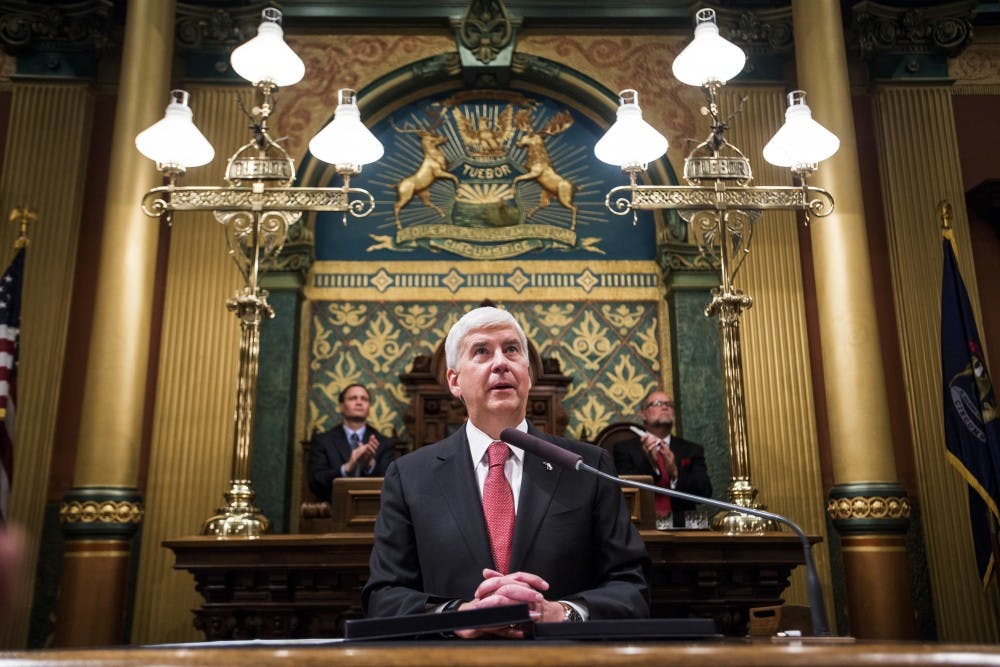On Feb. 23, a lengthy legislative session ended in the denial of a proposal that would’ve cut Michigan’s personal income tax from 4.25 percent to 3.9 percent. This comes as a significant defeat for Speaker of the House Tom Leonard, whose support for the tax cut wasn’t shared by fellow Republicans in the Senate.
Income tax bill falls short as state university presidents lobby against it

The bill initially sought to eliminate the income tax altogether, the state’s main source of general fund revenue, through a nearly 40-year period. An amendment to the bill was made Feb. 21, after nine presidents from Michigan public universities lobbied their opposition at the House in Lansing.
MSU President Lou Anna K. Simon told MLIVE she and other university presidents were in Lansing for a Michigan Association of State Universities meeting across the street when they spontaneously chose to lobby at the Capitol.
Michigan House Rep. Yousef Rabhi (D-Ann Arbor) was among the university presidents and others who gathered outside the House Chamber. Rabhi said he doesn’t expect another attempt at this tax cut for some time, citing the shared bipartisan division surrounding the proposal.
“A lot of Republicans don’t feel this is the right way to go,” Rabhi said.
The amended version would have decreased the income tax from 4.25 percent to 3.9 percent through four years starting Jan. 1, 2018, by 0.1 percent each year for the next three years and by 0.05 percent in the fourth year, reaching 3.9 percent, according to the Detroit Free Press. The revenue that would be lost in the first year is $195 million, $463 million in the second year, $780 million in the third year and $1.1 billion by the fourth.
If the proposal had passed, over $1 billion in state revenue would’ve been lost in the first fiscal year of it’s implementation and an additional $400 million each following year, according to a House Fiscal Agency analysis.
East Lansing Mayor Mark Meadows said every community in Michigan would have been impacted by this tax cut.
“There’s just no way to avoid it,” Meadows said, citing that the percentage of revenue going to local communities would have been decreased.
READ MORE
Although an income tax reduction from 4.25 to 3.9 had been proposed years ago, this was before Michigan Gov. Rick Snyder cut the business tax soon after taking office.
“This fails to recognize the history of what happened,” Meadows said. “We had other revenue sources that are no longer in existence at the time that we voted to reduce the income tax previously. Those are gone now. So this was just a bad idea from day one — unless there’s some additional tax that comes from another resource that makes up that difference.”
The main point of contention was a lack of any suggestions from sponsors of the bill as to how the resulting massive loss of state revenue will be mitigated.
Support student media! Please consider donating to The State News and help fund the future of journalism.
The most likely outcome would’ve been cuts made to state programming, infrastructure investment and higher education. A main concern the university presidents who gathered in Lansing had is what would’ve happened to university funding if the state budget suffered such a tremendous loss, according to MLive.
Simon said historically, higher education has been a place where revenue has been eliminated when state budgets are constrained, according to MLive.
"You take revenue away, a significant amount. Then you begin to say where would you take the revenue from,” Simon told MLIVE. "I've been here a long time and it happens almost always when the revenue is short.”
University of Michigan President Mark Schlissel told MLIVE their message to legislators was to slow down or risk rushing into something that would have a profound impact for future generations.
Rabhi said the proposed tax cut was fiscally irresponsible as it would have put a hole in the budget by hundreds of millions of dollars without any plans for replacing the lost revenue, and without any mention of what would have been cut from the budget to compensate.
Rabhi said without a replacement for the funding, it would ultimately result in less programs and cuts to higher education, schools, road funding and even police and fire departments that local governments provide.
“Often higher education is one of the first things on the chopping block as we saw — just historically within the last decade — as one of the things that gets the ax first before everything else,” Rabhi said.
Rabhi said he believes the university presidents have valid concerns over a personal income tax cut.
“I think they’re seeing the writing on the wall and they understand that if this tax cut passes, higher education will be one of the first things that the Republicans will consider cutting," Rabhi said.
Michigan had its last large budget cut in 2011, signed by Snyder, which cut higher education by 15 percent and universities have suffered the loss in funding ever since. Yet recently Snyder introduced a higher education Tuition Incentive Program, which seeks to increase state aid funding for public universities.
Snyder issued his concern over the proposed tax cut in a statement Tuesday and said he’d like to see a public plan for how the cuts would be paid for before he will support the bill.
“I still have a billion dollars’ worth of concerns because there has been no plan presented as to how this will affect residents and their communities statewide. Half of a billion dollars will come due in 2019 and over one billion by 2022, years in which we have planned funding specifically to invest in modernizing our state’s infrastructure,” Snyder’s statement said.






